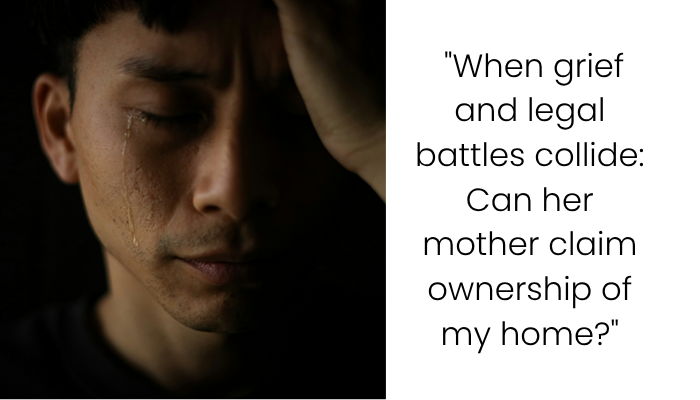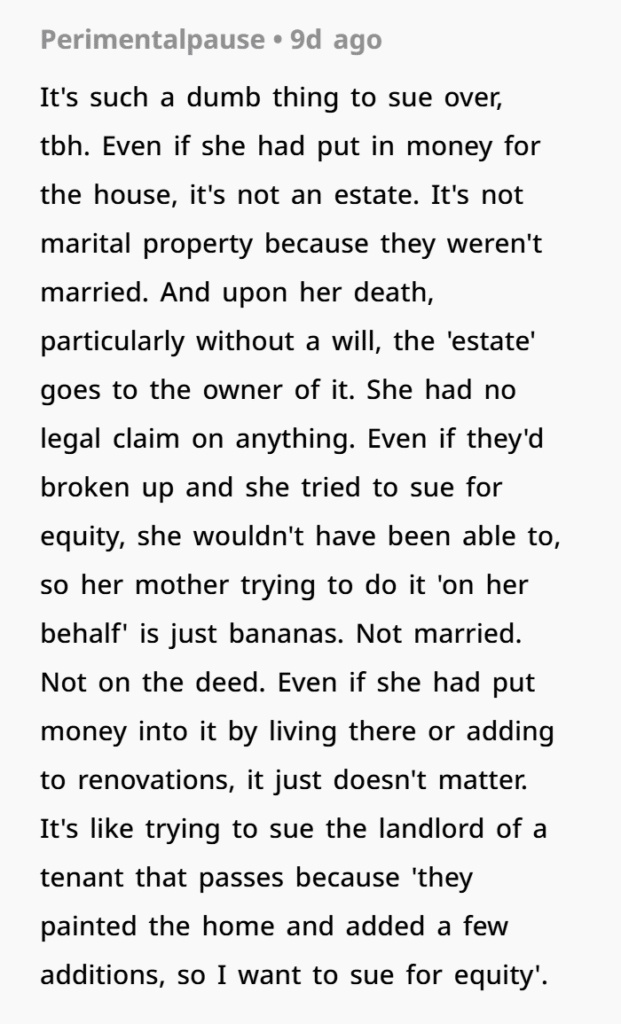Deceased Girlfriend’s Mother Threatens to Sue for Equity in My Home—What Are My Rights?

The OP shares a troubling situation in which the mother of his deceased girlfriend is threatening to sue him for equity in his home. The couple had been together for seven years, and the OP purchased the house a year into their relationship, with his name solely on the mortgage and all related bills. Following the girlfriend’s passing two years ago, the OP became the full owner of the house. However, the girlfriend’s mother recently contacted him, claiming that her daughter had contributed to the home—specifically for renovations—and is now demanding $100,000 from the OP’s property, stating that he owes it to her daughter’s estate. This has left the OP feeling confused and anxious, especially considering the history of animosity with the girlfriend’s mother, who has previously made unfounded accusations against him. The OP is seeking legal advice and guidance on how to navigate this potential legal battle.
Advertisement – Continue Reading Below
Some greedy people are so shameless that they even use deceased family as an opportunity to make money

The poster bought a house in his name when he was with his girlfriend, who passed away 2 years ago










This case involves several key legal and emotional complexities, particularly regarding property rights, estate law, and the tension between personal relationships and legal claims. First, the legal question centers around whether the girlfriend’s mother has any legitimate claim to the house or its equity. While the OP is clear that his name is on everything—the mortgage, the bills, and the deed to the house—her claim hinges on the idea that her daughter financially contributed to the home, particularly in renovations. However, given the OP’s clear documentation of sole ownership and the lack of evidence that the girlfriend contributed financially (such as no receipts or shared bank accounts), her legal position appears weak.
The claim of $100,000 is significant and seems arbitrary, especially without concrete evidence of the girlfriend’s alleged contributions. Estate law generally protects the rights of a deceased person’s estate, but the deceased’s mother would have to prove that her daughter made significant contributions to the home’s value to justify a claim for equity. The OP’s situation is further complicated by the emotional tension with the girlfriend’s mother, who has shown hostility in the past, including making baseless accusations. This adds a layer of personal conflict to the legal matter, and it’s crucial that the OP consults with an experienced attorney to ensure he is fully protected.
Advertisement – Continue Reading Below

From a legal perspective, Florida property law generally follows the principle of separate ownership unless there is clear evidence of joint ownership or shared financial contributions. Since the OP and his girlfriend did not have any legal arrangements that would grant her claim to the property, the likelihood of her successfully suing for equity is slim—especially given the absence of any formal financial contributions or shared ownership agreements. However, as this situation involves both family dynamics and legal considerations, the OP should meet with a qualified attorney who can assess the specific details of the case, especially to handle the potential estate claims and to ensure that he is not exposed to any unforeseen liabilities.
In conclusion, while the OP likely has a strong case in terms of property rights and ownership, legal complexities could arise depending on the specifics of the claim. Having a trusted attorney review the situation will help clarify the potential for any legal action and provide peace of mind during this challenging period.
Netizens were aghast at how low people fall just because of their insatiable greed, while many offered condolences for his late girlfriend












